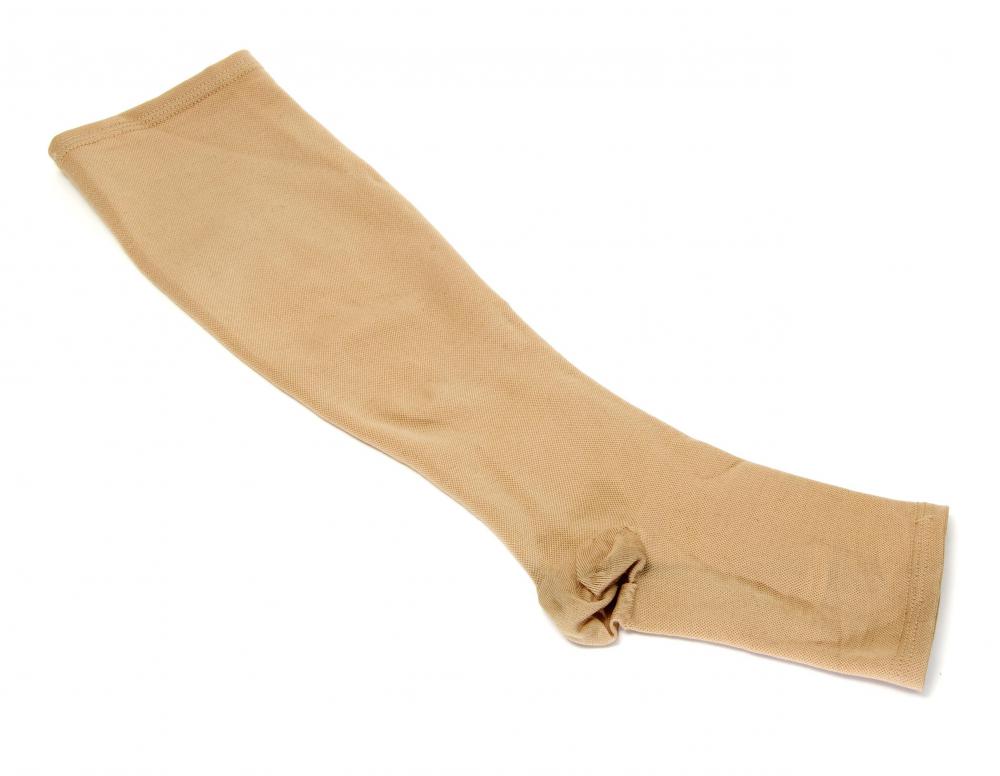At TheHealthBoard, we're committed to delivering accurate, trustworthy information. Our expert-authored content is rigorously fact-checked and sourced from credible authorities. Discover how we uphold the highest standards in providing you with reliable knowledge.
What is Fluid Retention?
Fluid retention is a medical condition which occurs when the body is unable to express fluid, causing it to build up either across the body or in a localized area. More properly known as edema, this condition is very common, and it can have a variety of causes and treatment approaches. It is often associated with pregnancy and hormonal changes caused by the use of hormonal birth control, along with circulatory problems, burns, certain medications, arthritis, and diseases of the liver, kidney, heart, and lungs.
Water plays an important role in the body. It is found in the circulatory system and in the tissues of the body, often in the form of a vehicle for nutrients or waste products. In healthy people, water is moved through the body in the lyphmatic system, which removes excess water while delivering fresh water, and the water is expressed through the kidneys in the form of urine. The body uses a number of systems to keep the water level in balance, adjusting urine production to produce more or less urine as needed. When these systems are disrupted, fluid retention can occur.

The most common symptom of retaining fluid is swelling which may be generalized or in a specific location, like the legs. People may also feel achy and sore, with joint pains, stiffness, and weight gain. In pitting edema, when the area of swelling is pressed, a small pit will form and slowly fill in, while in non-pitting edema, the skin will spring back after it is pressed.

Sometimes, fluid retention is benign, and it will resolve itself. For example, many women retain fluid during the phase in their menstrual cycle in which estrogen rises, and the retained water is expressed later. In other cases, it may be necessary to treat the water retention to avoid additional buildup and make the patient more comfortable. Treatment usually involves determining the underlying cause and addressing it.

People should not respond to fluid retention by drinking less water. Instead, they should consult a doctor to find out why they are retaining water, and what might be done to manage it. For example, sometimes compression garments can be used to help the body express the fluid, or a patient can variate the way in which he or she dresses, sits, or stands to prevent the buildup of fluid. Pregnant women who spend a lot of time on their feet may find, for example, that fluid retention in the legs and ankles can be reduced by resting with the feet elevated.
AS FEATURED ON:
AS FEATURED ON:















Discussion Comments
I have had fluid build up for the past three years and am 45 years old. I have seem many doctors and none have been willing to look at the cause (whatever that may be), and since none of the regularly prescribed meds are helping, I am told that I just have to live with it.
Now my arms and hands are swollen as well, and I do not fit in any of my shoes, or any other shoes on the market, which makes it impossible for me to work, and still I get the same answer: This is normal for your body! I am so frustrated and at the ends of my ropes. I live with constant pressure pain and miss out on most of the fun stuff with my kids. Very frustrated.
I think I have fluid retention, but don't know what to do.
I have a bloated belly, bags under my eyes and a puffy face which are all symptoms of this. When I press my belly, it goes far in and then, springs back out when I remove my finger.
I have been told to eat more bananas, strawberries etc. so I can maintain my sodium / potassium balance.
Is there anything else I can do?
I usually experience ankle fluid retention. Usually when I eat a lot of salty food and stand for long periods of time my ankles swell a little bit.
Usually the causes of fluid retention could be diet or something hormonal. For me it's my diet, I definitely do better when I drink more water. The more water I drink the more the swelling goes down because I eat a lot of food that is high in sodium.
I also had fluid retention in my ankles when I was pregnant. The fluid retention causes there were based on my hormones.
I tried to drink more water and keep my feet elevated whenever if could. You can really note the fluid retention edema by pressing a finger into the swelled area.
If you can see the indentation on the skin of where your finger was then you have fluid retention symptoms and should see a doctor for body fluid retention treatment .
Post your comments